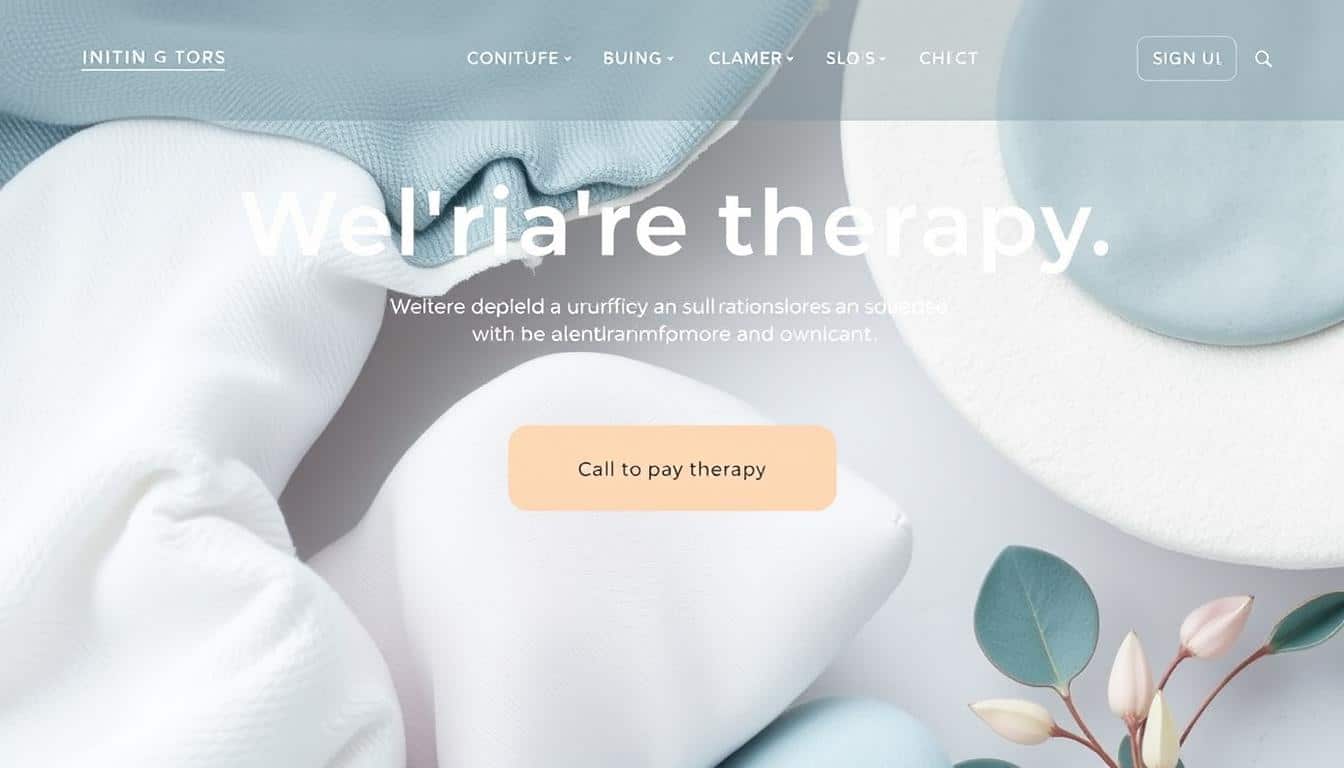In today’s world, your therapy website is the main way people find help. To reach more people, you need to do therapy website keyword research. This helps you find out what people are searching for. Then, you can make your website better and more visible online.
By doing this, you can get more visitors and turn more of them into clients. Whether you offer online therapy, mental health counseling, or teletherapy services, finding the right keywords is key. It helps you stand out in the online world of e-counseling platforms and digital mental healthcare.
When you match your website with what people are looking for, you become a trusted place for help. This is especially true for those looking for remote psychological support and internet-based therapy solutions.
Key Takeaways
- Effective therapy website keyword research is crucial for boosting your online visibility and attracting more clients in need of mental health support.
- Identifying the search terms and phrases used by your target audience is key to optimizing your website’s content and improving its ranking in search engine results.
- Leveraging the right keywords can help you stand out in the competitive online counseling resources market and connect with individuals seeking virtual therapy sessions and remote psychological support.
- Comprehensive keyword research enables you to tailor your website’s content to the specific needs and preferences of your potential clients, enhancing their engagement and conversion rates.
- Staying up-to-date with the evolving digital mental healthcare landscape and adjusting your keyword strategy accordingly is crucial for maintaining a strong online presence over time.
Importance of Keyword Research for Therapy Websites
In today’s world, therapy website keyword research is key for mental health pros to find clients. It helps you know what people are looking for and stay ahead online. This way, you can make your site more visible and reach those who need online therapy, mental health counseling, teletherapy services, and virtual therapy sessions.
Understanding Your Audience’s Search Intent
Good therapy website keyword research starts with knowing what your audience searches for. By figuring out their search intent, you can make your site more appealing. This means your content will better match what they’re looking for.
Staying Competitive in the Digital Landscape
Online mental health services are competitive. To stay on top, you need to do deep keyword research. This lets you see what your rivals are using. Then, you can make your site more strategic and effective.
“Effective keyword research is the foundation of a successful therapy website. It allows you to connect with your target audience and stand out in the crowded digital landscape.”
By using therapy website keyword research, mental health pros can boost their online presence. They can draw in more qualified leads. And, they can offer the care and treatments their clients need.
Identifying Relevant Therapy Keywords
Boosting your therapy website’s online presence starts with keyword research. Finding the terms and phrases people use to search for mental health services is key. This helps you make your website more visible online.
To find the best keywords for your online therapy, mental health counseling, and e-counseling platforms, try these strategies:
- Look at what your target audience is searching for. What are their common questions and concerns?
- Use keyword research tools to find out how often people search for certain therapy website keyword research terms.
- Explore long-tail keywords. They are more specific and less competitive, targeting specific digital mental healthcare niches.
- Keep up with new trends and changes in your audience’s language and preferences.
By focusing on keyword research, you can make sure your website reaches the right people. This drives more traffic and helps you connect with those who need your services.
“Effective keyword research is the foundation of a successful therapy website optimization strategy.”
Analyzing Search Volume and Competition
When you start therapy website keyword research, looking at search volume and competition is key. Knowing how much people search for certain keywords helps you plan your content. It also tells you which keywords to aim for.
Using Keyword Research Tools Effectively
Using strong keyword research tools is crucial. They give you data on search volume, how hard it is to rank for keywords, and who your competitors are. This helps you make smart choices for your online therapy services.
By studying search volume and competition, you find the best ways to reach people. This helps you focus on keywords that will get you noticed by those looking for your help. It’s all about making your online therapy solutions easy to find.
Using the insights from these tools can really change the game for your keyword research. It lets you make choices that bring in more visitors, engage your audience, and help people through your online therapy services.
Incorporating Keywords into Your Website Content
To make your therapy website more visible, it’s key to use the right keywords in your content. This helps search engines see how relevant your pages are. It also makes it easier for people looking for online counseling to find you.
Optimizing Page Titles and Meta Descriptions
Your page titles and meta descriptions are crucial for your website’s search engine ranking. Using your therapy website keyword research in these areas can boost your online visibility. It also draws more online therapy seekers to your site.
- Make sure your page titles match the content and include important keywords.
- Create engaging meta descriptions that make users want to visit your mental health counseling website.
- Keep your titles and descriptions short to follow search engine rules.
- Update these elements often to keep them working well.
By carefully adding your target keywords to your website, you can improve your search engine ranking. This helps you reach the online counseling resources your audience is looking for.

“Effective keyword integration is the foundation for a strong online presence in the therapy industry.”
Utilizing Long-Tail Keywords for Niche Targeting
When it comes to therapy website keyword research, long-tail keywords are a big help. They are more specific and less competitive. This means you can find the right clients by meeting their unique needs.
Using long-tail keywords in your online therapy or e-counseling platforms is smart. It lets you understand what your audience is looking for. This way, you can make content that really speaks to them.
- Find specific topics you’re good at, like “couples therapy for military families” or “cognitive-behavioral therapy for social anxiety”.
- Look for long-tail keywords related to these topics. Check their search volume and competition.
- Use these keywords in your website’s content in a natural way.
- Make sure your page titles, meta descriptions, and header tags include these keywords.
- Keep an eye on your analytics to see how your long-tail keywords are doing. Adjust as needed.
By focusing on long-tail keywords, you can show you’re an expert in your field. This attracts clients who really need your help.
“Niche targeting through long-tail keywords is the key to standing out in the crowded digital landscape of mental healthcare services.”
The digital mental healthcare world is always changing. So, it’s key to keep up with new trends and best practices in keyword research. By always improving your keyword strategy, you can make your online presence stronger. This way, you can reach the clients who really need your help.
Leveraging Local SEO for Therapy Practices
As a therapist, getting clients is key. Local SEO helps a lot. It makes your site more visible to people in your area who need your services.
Optimizing for Local Search Queries
To do well in local searches, focus on a few things:
- Claim and optimize your Google Business Profile (formerly Google My Business) listing, ensuring your practice’s name, address, phone number, and website are accurate and up-to-date.
- Incorporate relevant location-based keywords into your website’s content, such as the name of your city, neighborhood, or surrounding areas.
- Encourage your clients to leave positive reviews on your Google Business Profile and other online directories, as these reviews can significantly impact your local search rankings.
- Ensure your website is mobile-friendly and loads quickly, as these factors are important for local search visibility.
By using these local SEO tips, you can get more people to find your therapy website keyword research, online counseling resources, and remote psychological support services.
Success in local SEO means giving a great experience to potential clients. By making your online presence strong and using local search, you can grow your practice.
therapy website keyword research
Effective therapy website keyword research is key to unlocking your online presence. It helps you reach your target audience. By finding the right keywords, you make your website more visible to those looking for online therapy, mental health counseling, teletherapy services, and virtual therapy sessions.
Understanding what your audience is searching for is crucial. What do they want when they search for certain keywords? By meeting their needs, you can show them your therapy services are the answer. To stand out online, you need a strong keyword strategy.
Finding the best therapy keywords is the first step. Use deep research, look at search volume and competition, and use keyword tools. This helps you find terms that connect with your potential clients. Use these keywords in your website content, titles, and meta descriptions to boost your visibility and attract the right people.
Using long-tail keywords and local search queries can refine your strategy. This targets specific audiences and ensures your practice is found by locals. Regularly check and update your keywords to keep up with the digital world.
Mastering therapy website keyword research is a powerful step in building your online presence. By matching your content with your audience’s search queries, you attract the right clients. This helps them find the support they need.
Building an Authoritative Backlink Profile
In the world of digital mental healthcare, a strong backlink profile can change the game for your therapy website. Getting high-quality backlinks from respected sites in e-counseling platforms and remote psychological support can really help your site rank better and look more credible.
Importance of High-Quality Backlinks
Search engines like Google really care about a website’s backlink profile. Getting backlinks from trusted sites in internet-based therapy solutions shows them your content is valuable and trustworthy. This can help your site rank higher in search results.
Backlinks from top digital mental healthcare sites, respected mental health experts, and well-known therapy website keyword research blogs can greatly improve your SEO. This boosts your site’s online presence.
- Boost domain authority and trust
- Improve search engine rankings for key terms
- Bring in more referral traffic and engage users
- Make your brand a go-to in mental health
By working hard to build a strong backlink profile, your therapy website becomes a trusted source for remote psychological support and internet-based therapy solutions.
“A strong backlink profile is the foundation of a successful therapy website in the digital age.”
Remember, it’s better to have a few high-quality backlinks than many low-quality ones. Aim for backlinks from respected, relevant, and high-authority sites to maximize your therapy website keyword research efforts.

| Backlink Metric | Importance | Recommendation |
|---|---|---|
| Domain Authority (DA) | High DA backlinks signal authority and trust to search engines. | Aim for backlinks from websites with a DA of 30 or higher. |
| Relevance | Backlinks from websites in the mental health, healthcare, or related industries are more valuable. | Prioritize backlinks from relevant, niche-specific websites. |
| Anchor Text | Backlink anchor text should include your target keywords for maximum impact. | Diversify your anchor text to avoid over-optimization. |
Monitoring and Adjusting Your Keyword Strategy
Success in online therapy isn’t just about finding the right keywords. It’s about constantly monitoring, analyzing, and adjusting your strategy. This keeps you ahead in a changing world.
It’s important to regularly check how your keywords are doing. Look at search engine rankings, organic traffic, and conversion rates. This helps you see which keywords bring in the most valuable visitors and leads.
- Use web analytics tools to track your keyword performance over time.
- See how your rankings and traffic have changed for certain keywords.
- Check the quality of leads and inquiries from each keyword.
- Look for new trends or changes in search behavior in online counseling resources and mental health counseling.
With this data, you can make smart choices about your keyword strategy. You might target new long-tail keywords, improve existing ones, or change your focus to keep up with the market.
Adaptability is key to a successful therapy website keyword research strategy. By always monitoring, analyzing, and tweaking your approach, you’ll stay competitive. Your website will stay visible and appealing to your audience.
“The only constant in the digital landscape is change. Staying agile and responsive with your keyword strategy is essential for driving lasting success in online therapy.”
Integrating Keyword Research with Content Marketing
In today’s digital world, your therapy website’s success depends on more than just great services. It needs a smart mix of keyword research and content marketing to draw in and keep your target audience. By matching your content with the keywords people are searching for, you boost your online presence. This makes your practice a go-to for digital mental health.
Creating Engaging and Valuable Content
Good content marketing for therapy sites means making content that really speaks to your audience. Use your keyword research to find out what topics and questions matter most to them. Make sure your content is not just filled with keywords but also offers real value, advice, and a personal touch that connects with your readers.
- Write detailed blog posts about mental health, coping strategies, and the perks of teletherapy services and virtual therapy sessions.
- Make guides and resources that teach your audience about e-counseling platforms and digital mental healthcare options.
- Do videos and podcasts that tackle the unique issues and worries of your target group.
By regularly posting top-notch, keyword-rich content, you boost your therapy website keyword research rankings. You also build your practice as a reliable source, attracting more qualified leads and clients.
“Effective content marketing is not about selling – it’s about educating, informing, and engaging your audience to build trust and loyalty.”
The secret to blending keyword research and content marketing is creating a consistent, valuable, and focused experience for your potential clients. By using these strategies together, you can grow your online presence, attract the right people, and expand your therapy practice in the digital world.
Best Practices for On-Page SEO Optimization
Improving your online presence is key to attracting clients looking for remote psychological support or online therapy. Optimizing your website’s on-page SEO is essential. By following best practices, you can boost your website’s visibility and reach more people.
Begin by creating engaging page titles and meta descriptions. These elements are crucial for grabbing search engine users’ attention. Make sure to include your target keywords naturally while keeping the content friendly and easy to read.
Next, organize your content in a clear and simple way. Use header tags (H2, H3, etc.) to make your text easier to scan. Your headings should accurately describe the content and include relevant keywords without losing readability.
| On-Page SEO Best Practice | Description |
|---|---|
| Keyword-Optimized Content | Integrate your target keywords naturally into your content, avoiding overuse. |
| Unique and Engaging Meta Tags | Create unique, compelling page titles and meta descriptions that reflect your content and encourage clicks. |
| Organized Content Structure | Use header tags to improve readability and make your pages easier to scan. |
| Optimized Images and Videos | Optimize your multimedia content with relevant alt text and file names to boost search visibility. |
| Internal Linking Strategy | Develop a strategic internal linking structure to guide users and search engines through your site, showcasing your content’s depth and breadth. |
By applying these on-page SEO best practices, you can enhance your therapy website’s performance. This will help you connect with more online counseling resources and reach those who need your services.
“Effective on-page SEO is the foundation for driving targeted traffic and connecting with your ideal clients in the digital landscape.”
Conclusion
In this article, we’ve looked at how therapy website keyword research boosts your online presence. We’ve covered understanding your audience’s needs and using local SEO. Now, you know how to make your therapy website more visible and attract more clients.
Effective keyword research is key for a strong online presence in mental health services. Use the right keywords in your content and optimize your website. This way, you’ll be seen as a trusted source for online therapy and more.
Keep improving your keyword research and content marketing plan. Watch your progress and make changes as needed. Stay up-to-date with search trends and your clients’ needs. This will keep your therapy practice at the forefront online.



